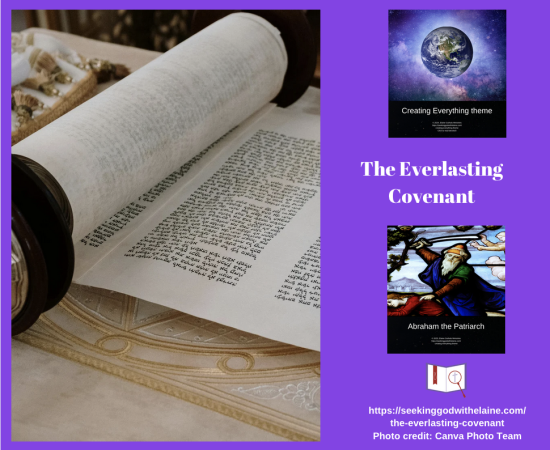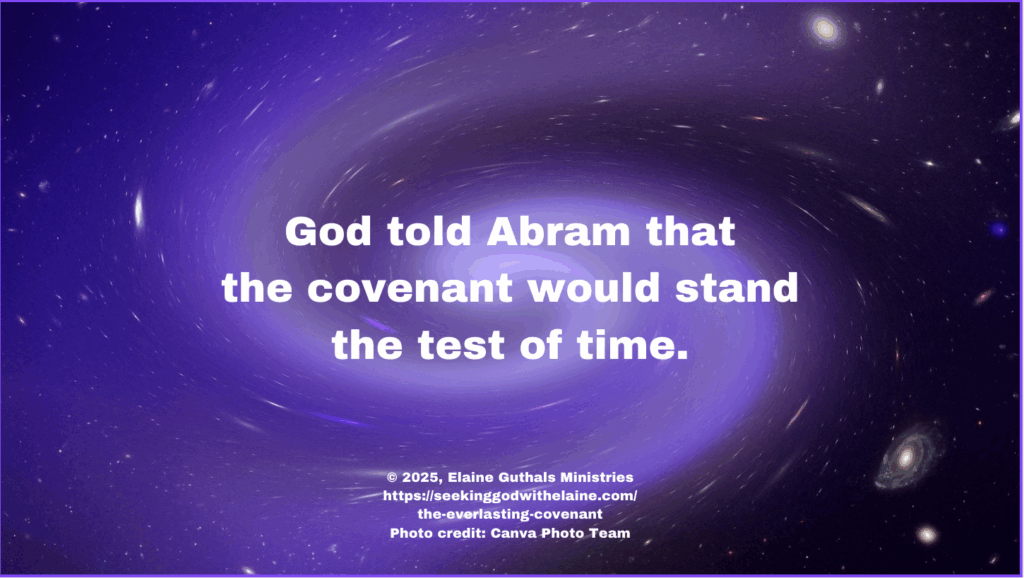We continue our discussion of the last recorded conversation between God and Abraham regarding their covenant. This devotional reading looks at how it is an everlasting covenant and what Abraham’s responsibilities were to fulfill it.
Nuggets
- God promises that the covenant with Abram will remain in effect throughout eternity.
- God’s making a covenant with Abraham was a sure thing, but Abraham had responsibilities that he had to perform.

In the last devotion, we started talking about the final component of the covenant between God and Abraham. This was when Abram got his name changed to Abraham.
The bulk of the verses though, in the last devotion and this one, focus on the covenant itself. Let’s see where the conversation went next.
Let's Put It into Context
To read devotions in the Creating Everything theme, click the button below.
Devotions in the Abraham the Patriarch series
Everlasting Covenant, Including the Land
“I will confirm my covenant with you and your descendants after you, from generation to generation. This is the everlasting covenant: I will always be your God and the God of your descendants after you. And I will give the entire land of Canaan, where you now live as a foreigner, to you and your descendants. It will be their possession forever, and I will be their God’” (Gen. 17: 7-8 NLT)
God promises that the covenant with Abram will remain in effect throughout eternity.
In this passage, God was confirming the covenant He made with Abram. God promised the land of Canaan to Abram four times.
- “Then the Lord appeared to Abram and said, ‘I will give this land to your descendants’” (Gen. 12: 7 NLT)
- “I am giving all this land, as far as you can see, to you and your descendants as a permanent possession” (Gen. 13: 15 NLT)
- “Then the Lord told him, ‘I am the Lord who brought you out of Ur of the Chaldeans to give you this land as your possession’” (Gen. 15: 7 NLT).
- “And I will give the entire land of Canaan, where you now live as a foreigner, to you and your descendants. It will be their possession forever, and I will be their God” (Gen. 17: 8 NLT).
We like to say third time is the charm. God went even one more.
God told Abram that the covenant would stand the test of time.

This covenant was for Abraham and his descendants. (Yeah, we get that with it being an everlasting covenant.) But does that mean they have no choice in the matter?
Abraham’s children still had free will. They had to choose to serve God.
But it also shows an important fact. “Understand, therefore, that the Lord your God is indeed God. He is the faithful God who keeps his covenant for a thousand generations and lavishes his unfailing love on those who love him and obey his commands” (Deut. 7: 9 NLT emphasis added).
We can take God’s promises to the bank.
- “It is God who enables us, along with you, to stand firm for Christ. He has commissioned us, and he has identified us as his own by placing the Holy Spirit in our hearts as the first installment that guarantees everything he has promised us” (II Cor. 1: 21-22 NLT).
- “God himself has prepared us for this, and as a guarantee he has given us his Holy Spirit” (II Cor. 5: 5 NLT).
- “The Spirit is God’s guarantee that he will give us the inheritance he promised and that he has purchased us to be his own people. He did this so we would praise and glorify him” (Eph. 1: 14 NLT).
I see you jumping up and down over there. No, the only land Abraham actually owned was the cave in which he and his family were buried.
I never thought of it this way before, but Ness was right. It is the same way with us and Heaven. We have the promise, but it is a promise for the future.
Resource
- “But don’t rejoice because evil spirits obey you; rejoice because your names are registered in heaven” (Lk. 10: 20 NLT).
- “Since everything around us is going to be destroyed like this, what holy and godly lives you should live, looking forward to the day of God and hurrying it along. On that day, he will set the heavens on fire, and the elements will melt away in the flames. But we are looking forward to the new heavens and new earth he has promised, a world filled with God’s righteousness” (II Pet. 3: 11-13 NLT).
If the promise to Abraham that the land would be his someday came true, it will for us, too.
In the last two verses of this passage, three times God says in three different ways that the covenant with be eternal.
- generation to generation (Gen. 17: 7)
- everlasting covenant (Gen. 17: 7)
- possession forever (Gen. 17: 8)
Sibbes noted that this was the first covenant of works. I don’t know if I agree with that. Adam and Noah both had to obey if they didn’t eat or did build an ark.
Okay. I get that. Noah had already built the ark and taken a ride when God made the covenant with him. Plus, God not flooding the earth again didn’t have anything to do with human’s obedience.
Sibbes made a great observation. He wrote, “… for we cannot fulfil the law that requireth personal obedience, perfect obedience, and exact obedience.”
Resource
We can’t fulfill the law. That was the whole reason why Jesus had to be our Savior. Even after we make a profession of faith and become children of God, we still break God’s laws and commandments.
But all the way from Adam until now – and what will continue until the end of the age – is that we obey God and walk with Him.
True, some will break the covenant and never return to it. Their fate is eternal punishment and separation from God.
There will be those who keep the covenant. They will live eternally on the Promised Land – Heaven or wherever we end up.
The Promised Land is a dwelling place with God. “There is more than enough room in my Father’s home [dwelling place]. If this were not so, would I have told you that I am going to prepare a place for you?” (Jn. 14: 2 NLT).
The Mark of the Covenant
“Then God said to Abraham, ‘Your responsibility is to obey the terms of the covenant. You and all your descendants have this continual responsibility. This is the covenant that you and your descendants must keep: Each male among you must be circumcised. You must cut off the flesh of your foreskin as a sign of the covenant between me and you. From generation to generation, every male child must be circumcised on the eighth day after his birth. This applies not only to members of your family but also to the servants born in your household and the foreign-born servants whom you have purchased. All must be circumcised. Your bodies will bear the mark of my everlasting covenant. Any male who fails to be circumcised will be cut off from the covenant family for breaking the covenant’” (Gen. 17: 9-14 NLT)
God’s making a covenant with Abraham was a sure thing, but Abraham had responsibilities that he had to perform.
We continue our discussion on Abraham’s part of the covenant. His part was simple.
• Walk in God’s presence (Gen. 17: 2)
• Be pure-hearted (Gen. 17: 2)
• Practice circumcision (Gen. 17: 10)
Bottom line is we have to be obedient to what God says.
That is logical. The original sin was all about humans’ disobedience to God. It goes to figure that any other dealings would have to include our willingness to be obedient.
It also makes sense that our responsibilities would be written out. Abraham is called the father of the faithful. If they weren’t written out, faithful to what?
Sibbes noted this was an important part of a covenant. He wrote, “A covenant is something to be done.”
Resource
It is easy to think that circumcisions began with Abraham, that this was a new and singular practice of the Hebrews/Israelites/Jews. Wrong.
Kalisch reported that it actually was first used by the Ethiopians and other Southern African nations. They would have used a stone knife.
Resource
That circumcision wouldn’t have been a religious ceremony. It probably started as a medical procedure to prevent incurable diseases and disorders. It may have addressed the physical benefits of the practice, one of them being cleanliness.
It seems a little odd to an outside observer that they would wait until puberty to perform the procedure. But they did.
The practice spread northward through Egypt. Other people groups performing this practice were the Arabians, Edomites, Ammonites, Moabites, Phoeniians, and Syrians.
So, did worship of God incorporate another pagan practice?
Kalisch thought not. He wrote,
“In no other institution, perhaps, do we see with greater force and distinctness that fundamental principle which pervades the whole legislative part of the Old Testament, and without regard to which it will ever be impossible to comprehend its full spiritual meaning, and to balance its exact historical value…By connecting the rite of circumcision with the purest ideas of resignation and piety, Mosaism laid a sure foundation for moral conduct; licentiousness, stimulated by the fiery temperament of the Oriental, was checked; the passions were restrained; and if sinful ideas or vicious imaginations arose within him, he was reminded by the covenant sealed on his flesh that he had promised holiness of life and innocence of the heart.”
Resource
Circumcision was required of all males in Israel. This included those who were born as slaves into the household or bought into it. No, God didn’t make it about a tight knit group.
“And he that is eight days old shall be circumcised among you, every zachar [male] in your dorot [generations], he that is born in the bais [house], or bought with kesef [money] of any foreigner, which is not of thy zera [descendants]” (Gen. 17: 12 OJB).
Does it seem strange that everyone connected either socially or domestically to Abraham had to be circumcised? Well, not if we think about it.
What did God keep telling the Wilderness Wanderers when they were ready to take over the Promised Land? “When the Lord your God hands these nations over to you and you conquer them, you must completely destroy them. Make no treaties with them and show them no mercy. You must not intermarry with them. Do not let your daughters and sons marry their sons and daughters, for they will lead your children away from me to worship other gods. Then the anger of the Lord will burn against you, and he will quickly destroy you” (Deut. 7: 2-4 NLT).
God knew having worldview people around would lead us to drawing away from Him. He didn’t want to put us in that predicament.
True, babies don’t have a choice, but their parents did, according to Kalisch. Yeah, circumcision was required but again, humans have free will.
Anyone who was not circumcised was cut off. “And the arel (uncircumcised) zachar [male] whose basar [meat] of his arelah (foreskin) is not circumcised, that nefesh [soul] shall be cut off from his people; My Brit hefer (he broke)” (Gen. 17: 14 NLT).
We are accountable for the company that we keep.

Remember, God is in the business of separating and dividing. He wants His children to have obvious differences from those around them.
There is another aspect to this. God works through families. This practice was to be handed down through the generations.
We can’t think the act of circumcision was just about the physical act, even though the stone knife used certainly made it that. We need to know the spiritual meaning of it.
Leale said this practice was to show the need for purification and its resulting in regeneration. By this act, others would know they were God’s people as they were dedicated to God.
Resource
We have to remember that blood is shed in this practice. That made it a personal covenant.
We know that only through the blood are our sins forgiven. Some may say that Jesus did away with the circumcision requirement. Oh, no.
Remember, Jesus said He wasn’t abolishing any laws. “Don’t misunderstand why I have come. I did not come to abolish the law of Moses or the writings of the prophets. No, I came to accomplish their purpose” (Mt. 5: 17 NLT).
Jesus never said that He was the law of Moses, but we can connect the dots to that.
- The laws reveal God’s character.
- God and Jesus have the same nature — They are one (Jn. 10: 30).
- f God is the law, then Jesus is the law.
Moses included circumcision of the heart. “The Lord your God will change your heart and the hearts of all your descendants, so that you will love him with all your heart and soul and so you may live!” (Deut. 30. 6 NLT).
Paul expanded on it. “No, a true Jew is one hose heart is right with God. And true circumcision is not merely obeying the letter of the law; rather, it is a change of heart produced by the Spirit. And a person with a changed heart seeks praise from God, not from people” (Rom. 2: 29 NLT).
Here was the ground of circumcision in the Jewish Church. It does transfer to the Church.
“Peter replied [to the question, ‘What must we do to be saved?’], ‘Each of you must repent of your sins and turn to God, and be baptized in the name of Jesus Christ for the forgiveness of your sins. Then you will receive the gift of the Holy Spirit. This promise is to you, to your children, and to those far away — all who have been called by the Lord our God’” (Ac. 2: 38-39 NLT).
Candlish said this because it is a covenant of grace. He wrote, “To a spiritually-minded Jew — to one who was an Israelite indeed — it was still the token of the better covenant, and the seal of the righteousness that is by faith.”
Resource
Then, as now, it is all about faith. It acknowledges God as our Creator. It praises Him for the gift of new life. More than this, it consecrates us to a holy life.
Making the Connections #1
Strong brought up a great point. If covenants are everlasting, why do they need to be renewed? He said that we need to
- Identify our unbelief
- Identify our lack of faith
- Ensure the sincerity of our hearts regardless of failed duty
- Exercise falseness in our hearts
- Grow our commitment to the covenant
- Combat any forgetfulness we may have
- Counteract our ignorance and blindness
Resource
This is important because we know that we are going to break our covenant with God. Covenant renewal helps us to fix our relationship with God.

That means we have to be fully versed in the covenant to know how it is broken and how we fix it. It is our decision to do both break and fix.
Does that mean we bind ourselves to God, as Strong said? You betcha.
If we can’t bind ourselves to our Creator Who has our best interest in mind, with whom can we bind ourselves?
Making the Connections #2
True, some choose not to accept the covenant. What happens to them?
When Abraham’s descendants choose not to accept the covenant, their sins were more readily identified. That led to being disinherited.
Those that do choose to accept the covenant form God’s Church. I know. Some today think church isn’t important or relevant.
They would be wrong.
Making the Connections #3
Leale argued that the act of circumcision showed the doctrine of salvation.
- The need for being restored to God.
- The controlling of the flesh
- The need for repentance
- The need for a Savior.
Resource
That is especially true in the circumcision of the heart. Circumcision has to get to the heart level.
Making the Connections #4
In some countries, it is now a standard practice for male children to be circumcised regardless of religious belief. Does this mean — today — that every male who is circumcised has his ticket punched for Heaven?
No. We must each make our own decision to follow Jesus.
Making the Connections #5
We do have a different ordnance that we adhere to. It is called baptism.
“When you came to Christ, you were ‘circumcised’ but not by a physical procedure. Christ performed a spiritual circumcision — the cutting away of your sinful nature. For you were buried with Christ when you were baptized. And with him you were raised to new life because you trusted the mighty power of God, who raised Christ from the dead” (Col. 2: 11-12 NLT).
Some believe in baptizing babies. Some allow it to be their choice after salvation.
Either way, instruction is to be given to train them to perform the duties required by the covenant.
Making the Connections #6
Candlish reminded us about the timing. In approximately one year, Abraham would become a father to the son of the covenant. The last time (Ishmael) was in a worldly act. This time, God would be exercising His Will.
Resource
I wouldn’t call this a redo, as we did with Noah. To me, this looks more like a reset.
It foresees another birth that occurs solely through God’s Will. It highlights the circumcision of the heart.
Making the Connections #7
Did we ever think about why the son wasn’t named until he was circumcised? It may be because that was when Abram’s name was changed to Abraham.
How Do We Apply This?
- Renew our covenant when we have sinned.
- Renew our covenant when we’ve been publicly humiliated.
- Renew our covenant in time of social upheaval.
- Renew our covenant to give a testimony to God’s mercy.
- Renew our covenant at the onset of temptation.
- Renew our covenant before we take the Lord’s Supper.
- View circumcision as a hope and encouragement.
- Allow God to circumcise our hearts.
Resources
Father God. We give You our hearts. We know that they are wicked (Jer. 17: 9), but we choose Jesus as our Savior. We choose to walk with You daily and ask you to circumcise our hearts. Amen.
What do you think?
Leave me a comment below (about this or anything else) or head over to my Facebook group for some interactive discussion.
If you don’t understand something and would like further clarification, please contact me.
If you have not signed up for the email providing the link to the devotions and the newsletter, do so below.
If God has used this devotion to speak with you, consider sharing it on social media.